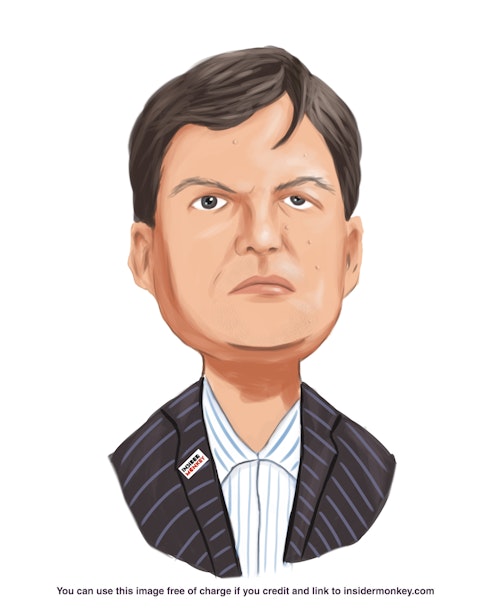In this article, we will take a look at the 10 Michael Burry Stocks with Huge Upside Potential.
Michael Burry, founder and manager of Scion Asset Management, is best known for predicting and profiting from the housing bubble’s collapse in the mid-2000s. His bold contrarian bet was famously chronicled in the book and film “The Big Short.” Burry’s investment strategy draws heavily from the rigorous market analysis and principles outlined in Benjamin Graham and David Dodd’s 1934 book “Security Analysis.” The book championed the merits of financial statement analysis, highlighting the importance of intrinsic value and structured investment principles.
That said, Burry has never shied away from putting his own distinct stamp on Wall Street’s time-tested principles. By utilizing complex financial tools, such as derivative securities and short-selling, Burry has amassed a fortune, challenging conventional market wisdom. His 2001 Scion Value Fund letter provides a fascinating insight into his contrarian outlook, which prioritizes long-term value over short-term price fluctuations. Burry makes it clear that to achieve significant long-term returns, he is willing to tolerate short-term volatility. He stated:
“I will always choose the dollar bill carrying a wildly fluctuating discount rather than the dollar bill selling for a quite stable premium.”
He also has no qualms about making significant investments in a few stocks that he believes are undervalued, a tactic the investor employed to strengthen Scion’s holdings at the end of 2024.
In the quarter that ended on December 31, 2024 just before DeepSeek’s artificial intelligence breakthrough sparked a $1.3 trillion surge in Chinese tech stocks, Michael Burry offloaded some of his investments in the country’s tech stocks. The moves came amid a period of high volatility for Chinese stocks, when investors appeared to be losing faith in Beijing following the implementation of a stimulus package in late September. The government’s actions triggered a wild rally until early October, though momentum waned due to a property crisis, a poor economic outlook, and dissatisfaction with the scope of fiscal stimulus in the following months.

Michael Burry of Scion Asset Management
Our Methodology
For this article, we examined Scion Asset Management’s Q4 2024 13F filings to list down Michael Burry’s stock picks with the highest upside potential. We ranked the companies in ascending order of their upside potential. These equities are also popular among elite hedge funds.
Why are we interested in the stocks that hedge funds pile into? The reason is simple: our research has shown that we can outperform the market by imitating the top stock picks of the best hedge funds. Our quarterly newsletter’s strategy selects 14 small-cap and large-cap stocks every quarter and has returned 373.4% since May 2014, beating its benchmark by 218 percentage points (see more details here).
10. Molina Healthcare, Inc. (NYSE:MOH)
Scion Asset Management’s Q4 Stake: $7.27 million
Analyst Upside as of May 9: 14.87%
Number of Hedge Fund Holders: 48
Molina Healthcare, Inc. (NYSE:MOH) is a managed care company that primarily provides health insurance to individuals with low incomes through Medicaid and Medicare. The company provides healthcare coverage through government contracts, premiums, and value-based medical care.
On April 24, Cantor Fitzgerald reiterated its favorable outlook on Molina Healthcare, Inc. (NYSE:MOH) shares, keeping an Overweight rating and $356 price target. The firm’s analysts expressed their confidence in the company’s valuation, citing the possibility of higher Medicaid and Medicare margins by 2025. Cantor Fitzgerald added that investors had previously voiced concerns regarding Medicaid margins, which were impacted by a surge in respiratory illnesses. However, Molina’s recent success, notably in surpassing the Medicaid Medical Loss Ratio, has given some confidence.
Molina Healthcare, Inc. (NYSE:MOH) posted solid Q4 2024 and full-year results, with total revenue of $40.65 billion, up 19% from 2023. However, operational cash flow decreased to $644 million from $1.66 billion in 2023 owing to timing mismatches in government receivables and payables.
9. The Estée Lauder Companies Inc. (NYSE:EL)
Scion Asset Management’s Q4 Stake: $7.49 million
Analyst Upside as of May 9: 14.97%
Number of Hedge Fund Holders: 49
The Estée Lauder Companies Inc. (NYSE:EL) is a well-known American multinational cosmetics company that manufactures and markets makeup, skincare, fragrances, and hair care products. The company boasts a presence in over 150 countries and territories under numerous brand names, including Estée Lauder, Aramis, and Clinique.
The Estée Lauder Companies Inc. (NYSE:EL) reported third-quarter fiscal year 2025 earnings of $0.65 per share, which exceeded the expected $0.31. The company’s revenue surpassed estimates, reaching $3.55 billion compared to the expected $3.52 billion. Despite its outstanding financial performance, Estee Lauder faces challenges, including a 9% reduction in organic sales and a 28% loss in Travel Retail sales. Estee Lauder’s management also expects an organic sales drop of 8% to 9% in fiscal year 2025, with adjusted EPS ranging from $1.30 to $1.55.
On May 2, UBS analyst Peter Grom raised his price target on The Estée Lauder Companies Inc. (NYSE:EL) to $62, up from $60, while keeping a Neutral rating on the company’s shares. Grom acknowledged Estée Lauder’s third consecutive quarterly earnings beat, citing better profitability. However, he noted that the company’s near-term quarterly projection fell short of the expectations. Grom discussed the company’s attempts to increase transparency about its near-term financial prospects and the possible impact of tariffs. Nonetheless, he implied that investors may still be concerned about the company’s earnings potential for fiscal year 2026 due to a lower fourth-quarter exit rate and tariff uncertainty.
8. Baidu, Inc. (NASDAQ:BIDU)
Scion Asset Management’s Q4 Stake: $10.53 million
Analyst Upside as of May 9: 22.81%
Number of Hedge Fund Holders: 50
Baidu, Inc. (NASDAQ:BIDU), a leading Chinese technology company, manages China’s largest internet search engine. Beyond its primary search business, the company has expanded into AI-driven initiatives that include cloud computing, self-driving technology, and conversational AI models like Ernie.
Macquarie analyst Ellie Jiang cut Baidu, Inc. (NASDAQ:BIDU) price target to $83 from $85, while maintaining a Neutral rating on the company. Jiang stated that while Baidu is growing the amount of AI-generated content on its search platform, the plan for monetizing these AI enhancements is still unclear. This is especially important considering the current sluggish economic climate and strong competition in China’s search market. Jiang offered a conservative forecast for Baidu’s advertising segment, estimating a 6% year-over-year decrease in revenue to Rmb15.9 billion in the first quarter of 2025. However, despite present obstacles, there is a positive aspect concerning Baidu’s AI Cloud, which is progressing as a significant area of growth. The AI Cloud’s revenue is predicted to climb by 25% year on year in the first quarter to Rmb5.9 billion, which could help ease the challenges faced by the company’s advertising segment.
7. PDD Holdings Inc. (NASDAQ:PDD)
Scion Asset Management’s Q4 Stake: $7.2 million
Analyst Upside as of May 9: 27.60%
Number of Hedge Fund Holders: 85
PDD Holdings Inc. (NASDAQ:PDD) is a global commerce company that operates several businesses, including two key ventures: Pinduoduo and Temu. Pinduoduo is an e-commerce platform with a wide range of products, whereas Temu is an online marketplace that specializes in heavily discounted consumer goods.
PDD Holdings Inc. (NASDAQ:PDD) has begun implementing a strategic shift in its business strategy for Temu. The platform will now exclusively focus on goods offered by local American merchants, abandoning its previous approach of selling low-cost Chinese imports. PDD Holdings’ move to adopt a “local fulfillment” approach is expected to reduce the impact of tariffs on its operations, perhaps allowing the company to retain competitive pricing for its customers in the US.
On April 28, Citi reduced its price target for PDD Holdings Inc. (NASDAQ:PDD) from $150 to $127 while maintaining a Neutral rating. The firm anticipates the company to announce its first-quarter results by the end of May, but notes “several uncertainties.” Citi’s analyst believes that before new tariffs are implemented, there is a potential for a brief increase in US sales as customers rush to make purchases before the spike in prices. That said, Citi anticipates PDD’s share price to stay within a particular range until there is additional information about how the new tariffs will influence the company’s earnings.
6. Oscar Health, Inc. (NYSE:OSCR)
Scion Asset Management’s Q4 Stake: $2.68 million
Analyst Upside as of May 9: 28.03%
Number of Hedge Fund Holders: 107
Oscar Health, Inc. (NYSE:OSCR) is a health insurance company which makes use of a full-stack technology platform to offer and manage insurance. Its primary operations and services include health insurance plans, technology platform +Oscar, and member services. The company focuses on the health insurance sector through telemedicine, healthcare-focused technological interfaces, and transparent claims pricing systems.
On May 7, Oscar Health, Inc. (NYSE:OSCR) announced first-quarter revenue and earnings that surpassed analyst expectations. The company reported adjusted earnings per share of $0.92, exceeding the consensus estimate of $ 0.81. Revenue for the quarter was $3.05 billion, surpassing the forecast of $2.84 billion and representing a 42% year-over-year increase from the $2.14 billion in Q1 2024. As of March 31, the company had over 2 million members, up from 1.45 million the previous year.
Artificial Intelligence is another area of growth for the company. During Oscar Health’s fourth-quarter results call, CEO Mark Bertolini stated that the company is rapidly deploying artificial intelligence in additional areas of its business. He stated that last year, the company implemented AI in 11 new use cases. Ten further use cases are being planned for the first quarter of 2025.
Longleaf Partners Small-Cap Fund stated the following regarding Oscar Health, Inc. (NYSE:OSCR) in its Q4 2024 investor letter:
“Oscar Health, Inc. (NYSE:OSCR) – Health insurance and software company Oscar was a top detractor for the quarter while remaining a top contributor for the year. The company delivered another strong quarter operationally, achieving over 60% year-over-year revenue and membership growth, while advancing toward its publicly stated goal of 5% operating income margins. Despite the operational progress, the Trump presidential win weighed on the stock price in the quarter due to added uncertainty around the future of the enhanced ACA subsidies set to expire at the end of 2025 and broader implications for the ACA itself. Oscar still has underappreciated non-earning assets in various regions at different stages of ramp-up, transitioning from investment mode in some areas to higher-margin operations in others. We view this as a long-term positive, highlighting the embedded long-term growth potential at Oscar. While election-related news contributed to stock volatility in the second half of the year, we capitalized on the volatility by strategically trimming and adding to our position. It was powerful to see both co-founder Josh Kushner and CEO Mark Bertolini (via his foundation) each purchase more than $10 million worth of stock in the wake of the election selloff.”
5. Alibaba Group Holding Limited (NYSE:BABA)
Scion Asset Management’s Q4 Stake: $ million
Analyst Upside as of May 9: 32.90%
Number of Hedge Fund Holders: 107
Alibaba Group Holding Limited (NYSE:BABA) is a technology and e-commerce company that serves consumers and small business owners. It is also a market leader in digital media, logistics, and cloud computing. Nonetheless, the Chinese company has struggled to develop in recent years due to regulatory hurdles and trade and technology tensions between the United States and China.
On April 14, Barclays reaffirmed its Overweight rating on Alibaba Group Holding Limited (NYSE:BABA), keeping a price target of $180. The firm’s analyst emphasized the rapid expansion of the company’s cloud business, which is projected to continue throughout the year. According to Barclays, cloud margins will likely stay consistent as Alibaba Group Holding Limited (NYSE:BABA) focuses on improving consumer adoption of AI during the industry’s “land grab” phase.
Alibaba Group Holding Limited (NYSE:BABA)’s cloud segment provides AI services such as image and audio recognition, natural language processing, and machine learning platforms. The company’s Qwen AI model has also gained significant popularity. Over 90,000 spin-off models have been developed, and over 290,000 users use its APIs through Alibaba Cloud.
4. Magnera Corporation (NYSE:MAGN)
Scion Asset Management’s Q4 Stake: $3.63 million
Analyst Upside as of May 9: 47.25%
Number of Hedge Fund Holders: 47
Magnera Corporation (NYSE:MAGN), formed through the merger of Glatfelter and Berry’s HH&S divisions, manufactures fiber-based engineered products. The company offers lightweight papers and composite fibers for a wide range of applications, including food and beverage, wall covering, technical specialties, composite laminates, and metallized products.
Magnera Corporation (NYSE:MAGN) reported second-quarter earnings and revenue on May 7 that fell short of analyst expectations, while also lowering its full-year guidance. The company cited ongoing global economic uncertainty impacting results. According to CEO Curt Begle Magnera is “prepared to take the appropriate operational and cost measures that align with short-term market realities” in the face of tariff-driven demand concerns. Looking forward, Magnera Corporation (NYSE:MAGN) reduced the range of its full-year comparable adjusted EBITDA guidance from $360 to $380 million. The company reiterated its post-merger adjusted free cash flow projection for fiscal 2025, standing at $75–$95 million.
Kingdom Capital Advisors stated the following regarding Magnera Corporation (NYSE:MAGN) in its Q4 2024 investor letter:
“Our most significant addition in Q4 was Magnera Corporation (NYSE:MAGN). The product of a merger between Glatfelter and Berry’s HH&S businesses, Magnera began trading independently in November. The combined entity should file their 10-K shortly and report their Q1 in February, after which we expect the improvement in volumes for their non-wovens will become apparent. This is not an exciting business, producing products like wipes, diapers, etc. Magnera was spun with a significant amount of debt, but we interpret their upsized $800m notes offering as a sign that the business is turning. The debt is cheap, termed out, and backed by significant assets. We expect Management to focus on deleveraging quickly. As a bonus, some of their business lines were impacted by cheap imports in recent years, and I expect Magnera could be a beneficiary of a tougher tariff regime. At a high level, here is our investment framework: • Magenra should have about $1.8B of net debt after the spin, and 36m outstanding shares, with about $400m of EBITDA. Shares currently trade at $18. • I think Magnera can generate >$100m of annual FCF for the next three years, while growing EBITDA to $475-500m via synergies and volume recovery. These businesses have averaged over $500m of annual EBITDA in the past decade, suggesting this normalization is not overly aggressive. • At their current 6x EBITDA multiple, that would imply the business trades for $40/share within three years (~120% upside/30% IRR).”
3. JD.com, Inc. (NASDAQ:JD)
Scion Asset Management’s Q4 Stake: $10.4 million
Analyst Upside as of May 9: 47.93%
Number of Hedge Fund Holders: 78
JD.com, Inc. (NASDAQ:JD) is a leading Chinese e-commerce company that focuses on computers and other electronic products, all the while serving as a supply chain-focused technology provider. Using its logistics network, JD.com has established itself as a major player in China’s online retail market.
On April 28, Citi analysts revised their outlook for JD.com, Inc. (NASDAQ:JD), lowering the price target to $51 from $56 while maintaining a Buy rating on the company’s stock. The adjustment comes after the company’s order volume rose from 5 million to 10 million within a span of merely ten days, showing a strong push into the food delivery market.
JD.com, Inc. (NASDAQ:JD) announced its financial results for the fourth quarter and full year 2024 on March 6, 2025, indicating strong year-over-year growth in a number of critical areas. The company reported Q4 net revenues of RMB347.0 billion ($147.5 billion), up 13.4% from the same period in 2023. Full-year net revenues also came in at RMB1,158.8 billion ($158.8 billion), up 6.8% from the previous year.
Patient Capital Opportunity Equity Strategy stated the following regarding JD.com, Inc. (NASDAQ:JD) in its Q1 2025 investor letter:
“We entered JD.com, Inc. (NASDAQ:JD), a leading e-commerce company in China. Unlike competitors in the space, JD focuses on consumer electronics and home appliances supporting strong differentiation and defendable margins. The company has been on a year-long organizational restructuring following its ill-advised venture into the low-cost competitive space where it lacked an advantage. Not only will the company benefit from returning to their roots, but the government has rolled out a trade-in rebate policy for home appliances and consumer electronics further supporting demand. At the same time, the company has been disciplined in terms of spending, creating a margin expansion story as the topline demand improves. With the Chinese government increasing their focus on reigniting consumer consumption, we believe JD is well positioned to benefit from increased demand and improving margins. At the same time, the company is returning cash to shareholders via a dividend yield of 3.0%, and a buyback program that has seen 8.1% repurchased in 2024. While the risk of a trade war with China is an overhang on the stock, the company generates the majority of their revenues domestically.”
2. V.F. Corporation (NYSE:VFC)
Scion Asset Management’s Q4 Stake: $4.29 million
Analyst Upside as of May 9: 47.93%
Number of Hedge Fund Holders: 36
V.F. Corporation (NYSE:VFC), formerly known as Vanity Fair, designs, distributes, and markets branded lifestyle footwear, accessories, and clothing. The company operates in three segments: Active, Outdoor, and Work, with brands including Vans, The North Face, and Timberland. It sells primarily to mass merchants, department stores, independently operated partnership stores, national chains, specialized stores, and direct-to-consumer platforms.
On April 30, Wells Fargo analyst Ike Boruchow raised V.F. Corporation (NYSE:VFC)’s shares from Underweight to Equal Weight while lowering the price target to $12 from $18. Boruchow remarked that the bear case for V.F. Corporation seemed to have fully developed. He acknowledged that VF Corp has been one of the worst performers in its industry, but feels that the market has now fully accounted for the delayed recovery of its Vans brand. The analyst mentioned that while there are still worries regarding V.F. Corporation’s balance sheet and free cash flow, the risk/reward profile has become more balanced, leading to a shift to a neutral stance.
Madison Small Cap Fund stated the following regarding V.F. Corporation (NYSE:VFC) in its Q4 2024 investor letter:
“We initiated a new investment position in V.F. Corporation (NYSE:VFC) (~8$b market cap). Formerly known as Vanity Fair, VF is the owner of a portfolio of apparel and footwear brands, namely Vans, The North Face, and Timberlands, which make up the lion’s share of the revenues. VFC is in a special situation with relatively new management, executing a turnaround strategy that we believe is value-maximizing and very shareholder-friendly. The company recently sold one of its portfolio brands, Supreme, for $1.5b and used the proceeds to pay down debt. They’ve reduced costs across the portfolio, including shrinking the Van’s retail business.
Although margins have improved from the recent trough as a result of these actions, there is ample room for expansion, and we believe the portfolio can be further rationalized. We would not be surprised if Timberland gets sold to further de-lever the balance sheet, leaving the company focused on two strong brands that have, we believe, room to grow mostly in international markets but also domestically. We further believe a fully rationalized portfolio with a cleaner balance sheet alongside a recovery in the Vans business could improve the intrinsic value, which we currently estimate to be $28 per share.”
1. Bruker Corporation (NASDAQ:BRKR)
Scion Asset Management’s Q4 Stake: $ million
Analyst Upside as of May 9: 50.84%
Number of Hedge Fund Holders: 34
Bruker Corporation (NASDAQ:BRKR), a leading American manufacturer of high-performance scientific equipment, focuses on tools for molecular and materials research, as well as industrial analysis. Its innovative analytical and diagnostic solutions support life sciences, pharmaceuticals, and industrial applications by allowing for exploration at the molecular, cellular, and microscopic levels.
Bruker Corporation (NASDAQ:BRKR) reported its Q1 2025 financial results on May 7, indicating strong revenue growth but declining earnings per share. The company reported revenue of $801.4 million, up 11% from $721.7 million for the same period in 2024. Acquisitions were the primary driver of this growth, accounting for 9.6% of the overall increase, while organic growth contributed 2.9%.
Bruker Corporation (NASDAQ:BRKR) also launched the X4 POSEIDON, a new benchtop 3D X-ray microscope system designed to provide high-resolution imaging capabilities comparable to larger systems. Moreover, at the 21st Annual US HUPO Conference, the company announced substantial advances in proteomics technology, including improvements in single-cell proteomics and other areas.
While we acknowledge the potential for BRKR as an investment, our conviction lies in the belief that some AI stocks hold greater promise for delivering higher returns and doing so within a shorter time frame. There is an AI stock that went up since the beginning of 2025, while popular AI stocks lost around 25%. If you are looking for an AI stock that is more promising than BRKR but trades at less than 5 times its earnings, check out our report about this cheapest AI stock.
READ NEXT: 20 Best AI Stocks to Buy Now and 30 Best Stocks to Buy Now According to Billionaires.
Disclosure: None. Insider Monkey focuses on uncovering the best investment ideas of hedge funds and insiders. Please subscribe to our free daily e-newsletter to get the latest investment ideas from hedge funds’ investor letters by entering your email address below.





